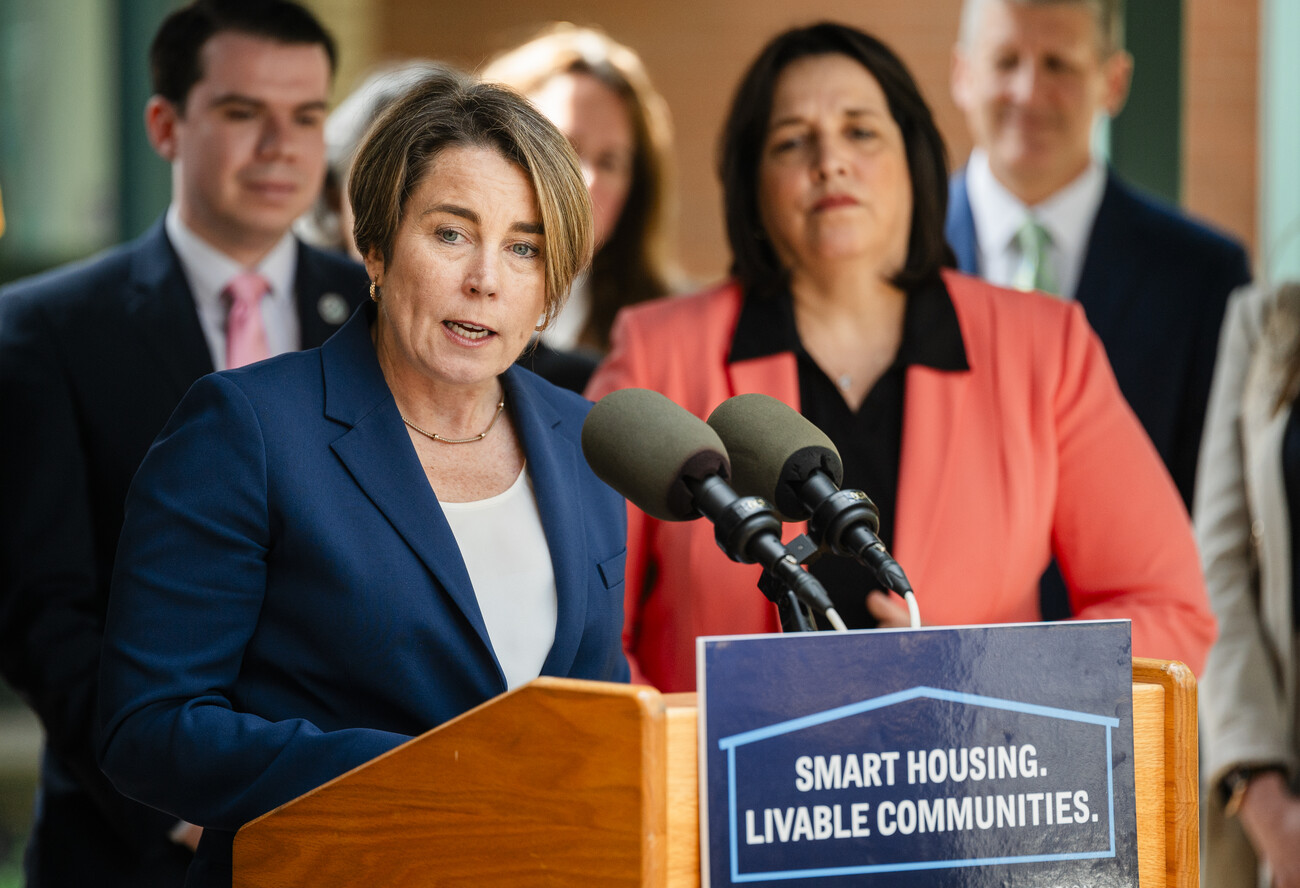Bussiness
Housing: The all-encompassing issue – Governor emphasizes business, economy, health, and transportation are impacted

LYNN — As part of a weeklong statewide campaign of the Healey-Driscoll administration, Gov. Maura Healey, Lt. Gov. Kim Driscoll, and municipal managers came to the city on Monday to talk about affordable housing.
Hosted by the Lynn Housing Authority and Neighborhood Development, Monday afternoon’s press conference focused on the administration’s plan to increase housing production and lower costs through the Affordable Homes Act and the MBTA Communities Law. The more specific issue highlighted was how increased housing production will help municipalities meet the needs of their residents.
Mayor Jared Nicholson said that the housing crisis is felt deeply in Lynn.
“Almost half of our households are cost-burdened and half of those are severely cost-burdened. So, (residents are) paying a majority of their income on housing costs,” Nicholson said.
Nicholson said the city recognizes that the housing crisis is a result of recent market forces and longstanding factors of “disinvestment” and “discrimination” that are forcing Lynn residents out of their homes, putting some residents at risk of losing their homes, and making it harder for new families to get their start.
“It’s causing concern for employers who are worried about being able to recruit and retain employees. So, it’s (an issue) that we have centered and we’ve committed ourselves to a vision of inclusive growth,” Nicholson said.
The city has implemented its first-ever comprehensive plan and is rewriting its zoning ordinance. Nicholson said that Lynn has seen some positive results, with 2,500 units currently under construction, 15% of them affordable.
“We’re excited with that momentum and just so excited to have a partner in the Healey-Driscoll administration that’s helping us do that,” Nicholson said.
Healey said housing is the biggest issue the state is facing.
In a closed-door meeting, members of the administration, Nicholson, and municipal managers discussed how high housing costs are impacting local residents and the local economy and government. Healey said they also discussed solutions and efforts that need to be and already are being supported.
“I’ve said it many times and it’s clear again today, that the need for more housing is a challenge to our economy and to our competitiveness. It’s a challenge to our public health and our quality of life,” Healey said. “Housing is the single biggest challenge facing Massachusetts.”
She said that is why the administration is proposing “historic levels of funding” through the AHA and working together with communities through the MBTA Communities Law.
According to the Commonwealth’s website, the AHA is a comprehensive package of spending and policy aimed at addressing the root causes of housing unaffordability. It includes $4 billion in capital spending authorizations, 28 “substantive” policy changes, three executive orders, and two targeted tax credits.
The MBTA Communities Law requires 177 cities and towns to establish “at least one district of reasonable size in which multi-family housing is permitted as of right.” Where possible, the district must be within half a mile from public transportation.
“I want to celebrate today the fact that over 40 cities and towns have already passed zoning plans intending to comply with the MBTA Communities Act,” Healey said. “Today and everyday, we will continue working together to build the homes and the communities that our residents need.”
Driscoll said the state doesn’t have enough market-rate homes for people to purchase or enough homes for people to rent.
“Nobody can keep up with these fast rising rents, and the lack of housing is impacting all of our communities across the Commonwealth,” Driscoll said. “It’s hurting our economy, it’s hurting our workforce, and that means it’s hurting our state.”
She said the largest source of outmigration from the state is not seniors leaving to go retire in “the sunshine state,” but 26-to-34-year-olds leaving due to their inability to afford a place to stay in the Commonwealth.
“That’s a concern. It’s a big chunk of our workforce, it’s hurting the fabric of our communities, and that’s not what Massachusetts is about,” Driscoll said.

Driscoll said that it is an issue that can be fixed, but one that depends on local and state governments working together. She said that another way to tackle the issue was creating a cabinet dedicated to housing, the Executive Office of Housing and Livable Communities.
“This is an existential threat that our cities and towns can feel in their bones. But the community leaders here today are standing united in purpose. Through innovations like the MBTA Communities Law and the Affordable Homes Act, we can work in concert to give our communities the tools to remove roadblocks to success. And the work doesn’t stop here,” EOHLC Secretary Ed Augustus said. “Together we can build a Massachusetts where everyone, from the barista to the banker, can afford to live.”
Other speakers at the press conference included Massachusetts Municipal Association Executive Director and CEO Adam Chapdelaine and Metropolitan Area Planning Council Executive Director Marc Draisen.
Both directors reiterated and emphasized that the housing crisis can be resolved if different stakeholders work together.
“In order to deal with the crisis we have before us today, we have to walk and chew gum at the same time. We have to do two things: We have to expand the supply of market-rate housing and we have to pay attention to preserving and developing new affordable housing,” Draisen said. “The reason that passing the Affordable Homes Act is the single most important thing we can do in Massachusetts today to address the housing crisis is because it recognizes both of these critical things.”








